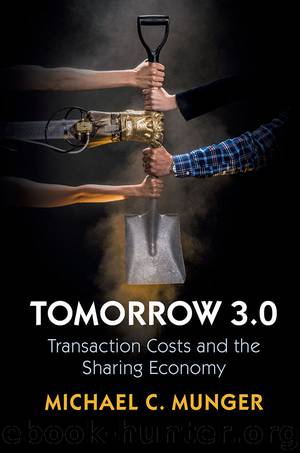Tomorrow 3.0: Transaction Costs and the Sharing Economy by Michael C. Munger

Author:Michael C. Munger [Munger, Michael C.]
Language: eng
Format: epub
Publisher: Cambridge University Press
Published: 0101-01-01T00:00:00+00:00
The answer is actually not clear. There was the “bad hitchhiker” in fiction, as in the movie Texas Chainsaw Massacre. There was the “rapist driver” in reality, as in the bizarre case of Colleen Stan, imprisoned and tortured from 1977 to 1984. But in terms of actual probabilities, there is little evidence that hitchhiking became much more dangerous.
But “trust,” or the lack of it, clearly increased the perceived transaction costs of hitchhiking, which became much less frequent. Instead of trying to hitchhike, travelers used other systems. And instead of picking up hitchhikers, drivers rode alone.
Software can “crowdsource” trust. The software itself does not provide the information; what happens is that many people independently record their experiences and perceptions, and what emerges is a powerful – and valuable – signal about reliability. Older people seem to want regulation, or some tangible source of trust, but younger people are used to relying on crowdsourcing. If you are in a strange city and you are looking for a restaurant, you do not ask the hotel concierge (who is likely to recommend a restaurant that bribed him), and you do not look at the local Health Department ratings. Young people use Yelp, or some similar software program that sells reductions in transaction costs. Negative reviews are quite damaging but informative.
The system is not perfect, but it is quite good. The key point is that BlaBlaCar, and other systems such as Uber and Airbnb, depend on their ability to crowdsource trust. The stakes are much higher than choosing a restaurant, of course, but the system still works. Remember: the software records the identity and financial information of all parties, and it provides a time-stamped record of all their interactions leading up to the actual transaction. It is certainly possible to fabricate an identity, but then it is possible to fake an employment record and work for a taxi company or a hotel. Customers, whether driver or passenger, know much more about their counterparts using BlaBlaCar than in the analogous situation of a shuttle or taxi driver.
Mazzella, founder of BlaBlaCar, recently created a whimsical character called “Trustman” (www.betrustman.com/). More formally, the crowdsourced trust solution is based on the D.R.E.A.M.S framework: “Declared, Rated, Engaged, Activity-Based, Moderated, Social, networks for trust.” Mazzella calls it “collaborative consumption,” and that’s really a key insight. According to the Trustman web site:
Today, we read and write reviews and ratings about just about everything: holiday destinations, restaurants, consumer goods, even people. And we trust these peer reviews: [R]ecent studies show that 75 percent of people trust them, against only 45 percent who trust advertising. These online ratings record trust and make it publicly available to everybody across the globe, at any and all times. The result is that the radius of trust has been radically enlarged to include everyone online. It’s what is enabling fast-growing sharing economy (a.k.a collaborative consumption) businesses like Airbnb and BlaBlaCar. Thanks to online profiles, we are now free to share or rent essential resources like cars or accommodation,
Download
This site does not store any files on its server. We only index and link to content provided by other sites. Please contact the content providers to delete copyright contents if any and email us, we'll remove relevant links or contents immediately.
International Integration of the Brazilian Economy by Elias C. Grivoyannis(109260)
The Radium Girls by Kate Moore(12013)
Turbulence by E. J. Noyes(8040)
Nudge - Improving Decisions about Health, Wealth, and Happiness by Thaler Sunstein(7689)
The Black Swan by Nassim Nicholas Taleb(7104)
Rich Dad Poor Dad by Robert T. Kiyosaki(6602)
Pioneering Portfolio Management by David F. Swensen(6284)
Man-made Catastrophes and Risk Information Concealment by Dmitry Chernov & Didier Sornette(6001)
Zero to One by Peter Thiel(5785)
Secrecy World by Jake Bernstein(4739)
Millionaire: The Philanderer, Gambler, and Duelist Who Invented Modern Finance by Janet Gleeson(4462)
The Age of Surveillance Capitalism by Shoshana Zuboff(4274)
Skin in the Game by Nassim Nicholas Taleb(4235)
The Money Culture by Michael Lewis(4196)
Bullshit Jobs by David Graeber(4177)
Skin in the Game: Hidden Asymmetries in Daily Life by Nassim Nicholas Taleb(3987)
The Dhandho Investor by Mohnish Pabrai(3757)
The Wisdom of Finance by Mihir Desai(3727)
Blockchain Basics by Daniel Drescher(3574)
